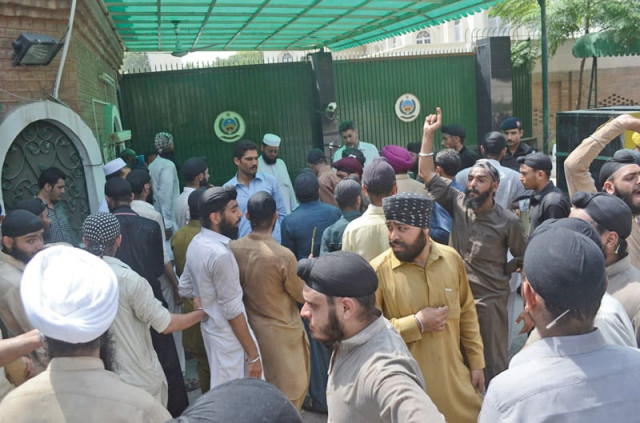The insecurity of life as a Pakistani non-Muslim
Hindus, Sikhs and Christians have all looked to foreign soil for safety

The insecurity of life as a Pakistani non-Muslim
Looking back, non-Muslims were safe from bigotry-based violence during the war against the former Soviet Union, waged by the Afghans with the help of US-led allies and the Arab world.
It all changed after the collapse of late Najibullah’s regime in 1992. Hindus and Sikhs from Afghanistan poured into Peshawar and then continued their journey either towards India or the West. The Afghan Mujahideen were part of internal conflicts over power, and Afghanistan and adjoining tribal areas were their safe havens. The fall of Afghanistan into the hands of the Taliban eventually turned the region into a ‘forbidden state’ for adherents of other faiths or other interpretations of Islam.
In the wake of 9/11, the infiltration of al Qaeda, Afghan Taliban and other militants into Waziristan from Afghanistan has caused irreparable loss of life and livelihood for non-Muslims.
Non-Muslims from not only Tirah but Swat, Buner, Shangla and Hangu were left with no choice but to abandon their homes and start a new life in Peshawar and cities in other provinces. Proof of Sikhs and Hindus pre-existing Pakistan lies in their ancestral homes and inherited businesses, yet these do not prevent extremists from targeting them.
A heavy cross to bear
While people from almost every religious minority are being affected by the ongoing militancy, Sikhs seem to be suffering more in the last few years. They are not only frequently targeted by killers but also abducted for ransom and have been forced to abandon homes and even the country. Reports of forced conversions have made headlines in international media and left human rights bodies clamouring for the protection of religious minorities.
In recent months, seven Sikh traders and a Muslim employee have fallen victim to target killing in Khyber-Pakhtunkhwa. Over a dozen have been abducted for ransom. Those killed in targeted attacks include Jagmohan, Mandar Singh, Mehendar Singh, Harbajan Singh, Dilsaz Singh, Bagwan Singh and Parmjeet Singh. The latter killed along with a Muslim employee, Zahid, in his shop at Shabqadar, Charsadda. Jaspal Singh was abducted by unidentified militants and later his body was found beheaded. Sardar Singh and Satnam Singh lost their lives in a rocket attack. Manmeet Singh and Parmjeet Singh were injured in the attack which killed Jagmohan and are still hospitalised.
Around 15 Sikh families—more than 100 individuals—recently migrated to India for the sake of survival. The matter of Hindus migrating from rural Sindh is more common but a large number of Hindu and Sikh families have also left Swat, Buner and Shangla for India.
Christians are also being persecuted and have been forced to find their way to safer destinations. On September 22, 2013, twin suicide bombing at All Saints Church Peshawar left nearly 100 dead and forced Christians of the city to realign their existence there.
Reports reveal after this tragic incident a large number of Christian families, mostly the younger generation, have left Pakistan and hundreds of others have filed for immigration or are considering seeking asylum.
For the polytheistic Kalasha in Chitral, the future looks bleak. Having lived for generations in peace, the increase in extremism in the region has left this non-Muslim community extremely vulnerable to poverty, threats and forced conversions. The government has declared the Kalash Valley a security risk for foreign and domestic tourists, depriving them of income. And on the other side of the border, the valley sits next to Nooristan, a province in Afghanistan considered to be a stronghold of both local and foreign militants, leaving the Kalasha between a rock and a hard place—to say the least.
Silent State
When communities are left unprotected by the state, criminal opportunists come running to exploit the situation. One example of this are the Sikhs in Peshawar. Aside from being killed, Sikhs have made scores of complaints about being robbed. As minorities, they have few equal-opportunity employment options and their businesses remain under the threat of being robbed or extortion.
Law and order in Khyber-Pakhtunkhwa continues to deteriorate and the ruling party is considered by many as sympathetic to the Taliban while holding the United States and the federal government responsible for the violence. The PTI is said to consider “talibanisation in Pakistan a reaction to US policies.”
Ahmadis had already been declared non-Muslims by the state and are harassed wherever they live, work, worship or are buried. But now the Talibanisation of society has also put the lives of those people at risk who adhere to various schools of Islamic thought such as Shias or Barelvis.
Harassment and murder on grounds of religion is furthered along the lines of sectarianism and no one—but a handful—is safe.
However, the government may try to justify the state of affairs, political and religious parties have failed to take legislative or executive steps to safeguard the rights of non-Muslims. A few parties might publically declare their secular political approach and are also at risk, making everyone who matters incapable of implementing any safeguards for adherents of other faiths.
Almost all articles of the Constitution which pertain to human rights give similar protection to non-Muslims but the government’s priorities remain misplaced and ineffective in this respect.
Implementation of such constitutional obligations could easily counter the growing sense of insecurity and deprivation among non-Muslims. No one can deny that Hindus, Sikhs, Christians, Kalasha and others are not only patriotic but are citizens of this country by birth right.
Published in The Express Tribune, August 30th, 2014.



















COMMENTS
Comments are moderated and generally will be posted if they are on-topic and not abusive.
For more information, please see our Comments FAQ